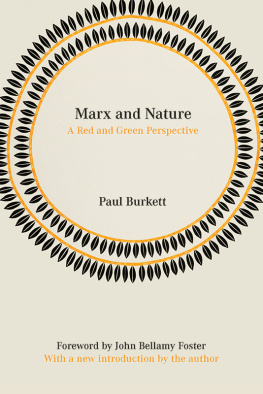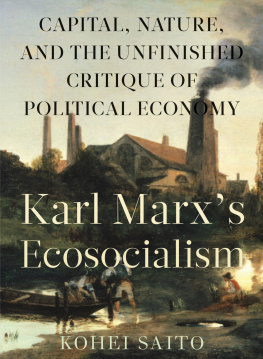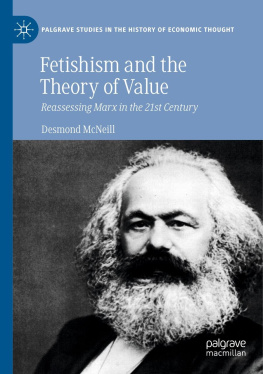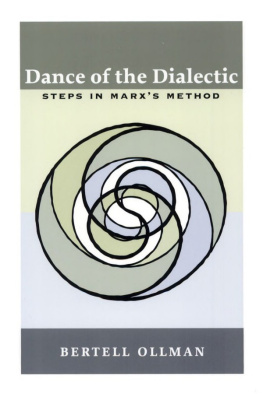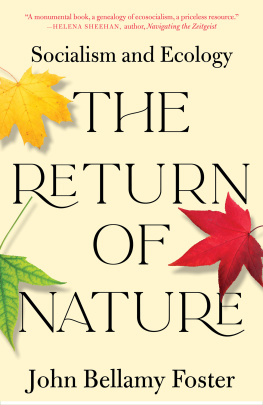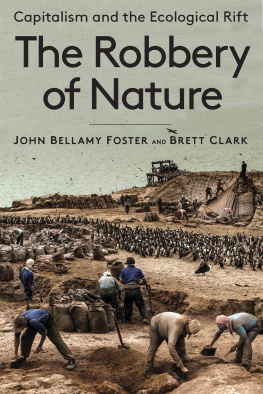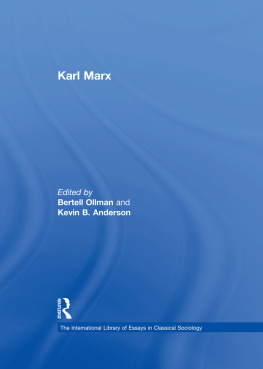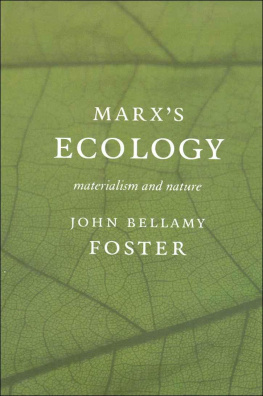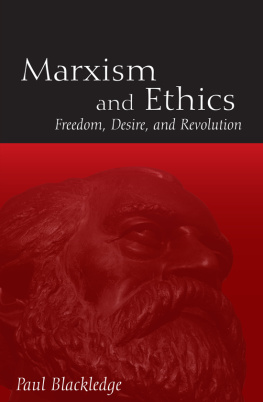Contents
For my mother and father
Introduction to the Haymarket Edition
As John Bellamy Foster observes in his foreword to the current edition, Marx and Nature had both negative and positive goals. On the negative side, it aimed at refuting the main criticisms of Marx that had been posed by environmental thinkers. At the same time, this refutation positively affirmed Marxs method of incorporating nature into his analyses of economic history in general and of capitalism in particular. In effect, the goal was not only to clear away the main misconceptions regarding Marx and nature that had accumulated along with the rise of various strains of environmentalist thinking, but also to demonstrate what classical Marxism could bring to the table of contemporary environmental analysis.
The Three Main Misconceptions
Responding to the charge that Marx embraced an ethic of productivist or Promethean domination of nature, I made three basic points in a defensive vein. First, for Marx, human wealth or use value was not reducible to labor; he always recognized nature as an inherent component of human wealth. Second, Marx was consistently aware that human production, under both capitalism and other systems, is constrained by natural, physical, biological, and even ecological laws. Even apart from human labor (itself a natural force), natural conditions actively shape the material-social forms of production and wealth under capitalism and all other modes of production. Third, Marx was highly cognizant of how the human development of productive forces, especially under capitalism, had wasted and destroyed natural wealth. Even more, he recognized that this resulted from a general break with the natural laws required for production to be ecologically sustainable, a break that reaches an extreme form under capitalist relations of production.
More affirmatively, I suggested that when Marx spoke of capitalism developing productive forces he took this largely as an empirical situation with which humanity and workers movements have to grapple. This helps explain what appears as a paradox to some nondialectical environmental thinkers, namely that Marx emphasized the potential for human development created by capitalisms development of the productive forces while at the same time condemning how capitalism develops productionwith respect not only to the exploitation of workers but also to the way capitalism treats nature. This point is of considerable contemporary relevance. If we are to do anything about environmental crises today, we cant treat capitalist development of the productive forces and its effects on nature as though it were a big mistake. Rather, we have to understand how it happens and look at the potential for a more sustainable system to grow out of this development of the productive forces. We need to look at how this development shapes things like class struggle and international conflict, instead of just condemning it on ethical grounds. We need to recognize, as did Marx, that humanity has a relatively autonomous relationship with nature compared to other species, due to the greater ability of human production to utilize and reshape the environment (and to damage it). Like Marx, we should not take this as something to be simply applauded or condemned; rather, we should treat it as an object of critical analysis and political struggle.
Marx and Nature also employed defensive and affirmative postures in its response to the (then-) conventional wisdom that Marxs economic analysis of capitalism, especially his value theory, excluded or discounted natures real contribution to production. On the defensive side, I argued that it is wrong to blame Marx for reducing value to abstract labor time; instead one should blame capitalism for this evidently antiecological form of wealth valuation. Marxs critics wrongly treat his value analysis as a normative assertion that, compared to nature, labor is a more primary or important element of production. But capitalisms reduction of the substance of value to abstract labor is not Marxs a priori preference; it is a result of his analysis of capitalist relations of production and exchange. In Marxs view, nature always contributes to wealth or use value, and labor is itself a metabolic relationship between people and nature. The tension between abstract labor as substance of value and the natural elements of wealth (including the wealth of human laboring capabilities) should be seen as a central part of the basic contradiction between use value and exchange value, as is emphasized by Marx.
Capitalist production relies on nature and human labor as material vehicles for the production of surplus value, yet in the aggregate it values commodities only according to the abstract labor they contain. This is a contradiction of capitalism, not a shortcoming of Marxs analysis. Once this is recognized, it becomes possible to interpret the value dimension of Marxs analysis not as an ecological embarrassment, but rather as a positive tool for analyzing the ecological contradictions of capitalism. Marx and Nature pursued this project by, first, unearthing from Marxs analysis several ecological tensions built into capitalist valuation of wealth by abstract labor as represented by money. To be specific, these forms of value are homogenous, divisible, mobile, reversible, and quantitatively unlimited. Contrast this with the qualitative variety (and ongoing variegation), indivisibility, locational specificity, irreversibility, and quantitative limits characterizing natural use values including ecological systems. The conclusion can only be that Marxs value analysiswhich explicitly highlights these tensions in Capital and related worksdemonstrates the potential for, the possibility of, environmental crisis under capitalism. I say potential and possibility because capitalisms concrete, historical interaction with its environment obviously cannot be read directly off the formal ecological contradictions of abstract labor, money, and monetary valuation. Analysis of actual environmental crises requires detailed study of the systems historical development as shaped by the systems specific pattern of technological change, as well as class and competitive struggles on both the national and global levels.
Marx and Nature provides important tools for such historical crisis analyses. It shows how the ecological tensions generated by capitalist valuation emerge again and again as Marxs analysis proceeds from the basic forms of commodity exchange, to the exchange of labor power for a wage, to the exploitation of labor power in production (creation of surplus value), to the use of machinery and management techniques to intensify this exploitation, to the complexities of the turnover and reproduction of the total social capital, and finally to phenomena involving commodity speculation, interest, and rents. At each step in his analysis, Marx is keenly aware that production remains a material processthat is, one reliant on natural wealtheven as it is converted into a vehicle for the accumulation of capital, of abstract wealth. And he points out the various tensions, contradiction, conflicts and, yes, crises connected with this twofold character of capitalist production.
Marx observes, for example, that the very existence of wage labor presumes a forcible separation of workers from the natural conditions of production, starting with the land. That is, alienation from nature is a fundamental characteristic of capitalism. Marx goes on to characterize the essence of surplus valuethe whole basis of capital accumulationas the extraction of the vital force of workers and their families, i.e., explicitly as a material, biological, and energetic extraction process which, if prolonged or intensified beyond naturally determined limits, results in the vitiation, deformation, and even death of workers. Marx also emphasizes how capital accumulation relies on the free appropriation of any and all elements of natural and social wealth that can serve as material vehicles for the creation and realization of surplus value. Even when such productive wealth can be monopolized and yield a rent, it is still freely appropriated from the standpoint of capital as a social whole, since rents merely redistribute pre-existing values.
Next page
